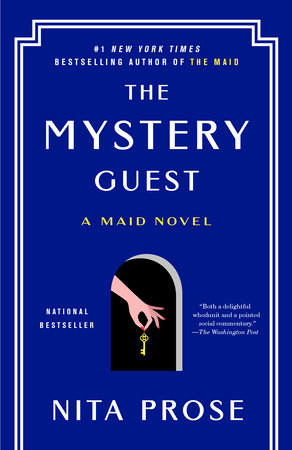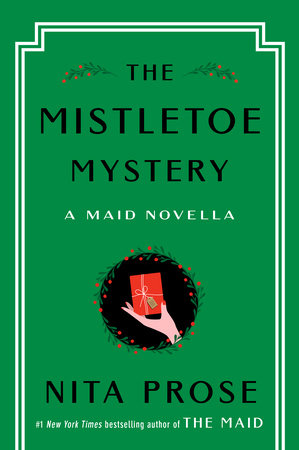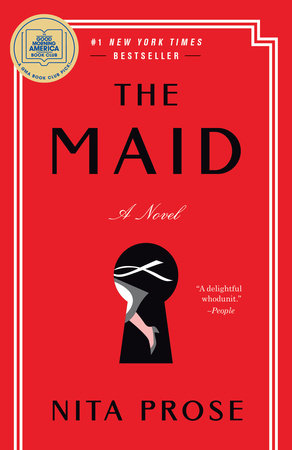Excerpt
The Mystery Guest
Chapter 1My beloved grandmother, a.k.a. my gran, worked her whole life as a maid. I have followed in her footsteps. It’s a figure of speech. I could not literally follow in her footsteps because she has none, not anymore. She died just over four years ago, when I was twenty-five years old (ergo, a quarter of a century), and even before that, her walking days came to an abrupt end when she suddenly fell ill, much to my dismay.
The point is: she is dead. Gone, but not forgotten, never forgotten. Now my feet follow a proverbial trail all their own, and yet I owe a debt of gratitude to my dearly departed gran, for it is she who made me who I am.
Gran taught me everything I know, such as how to polish silver, how to read books and people, and how to make a proper cup of tea. It is because of Gran that I have advanced in my career as a maid at the Regency Grand Hotel, a five-star boutique hotel that prides itself on sophisticated elegance and proper decorum for the modern age. Believe me when I say I started at the bottom and worked my way up to this illustrious position. Like every maid who has ever walked through the gleaming revolving doors of the Regency Grand, I began as a Maid-in-Training. Now, however, if you step closer and read my name tag—aptly placed above my heart—you will see in large block letters:
MOLLY
which is my name, and in delicate serif script underneath it:
Head Maid
Let me tell you, it’s no mean feat to climb the corporate ladder in a five-star boutique hotel. But I can say with great pride that I have held this lofty position for going on three and a half years, proving that I am no fly-by-night, but as Mr. Snow, hotel manager, recently said about me in an all-staff meeting, “Molly is an employee who sustains an attitude of gratitude.”
I’ve always struggled with understanding the true meaning behind people’s words, but I’ve gotten a lot better at reading people, even strangers, which is why I know what you’re thinking. You think my job is lowly, that it’s a position meriting shame, not pride. Far be it from me to tell you what to think, but IMHO (meaning: In My Humble Opinion), you are dead wrong.
My apologies. That came out a bit gruff. When Gran was alive, she’d counsel me on tone and advise me when I’d likely offended. But here’s the interesting thing: she’s dead, yet I still hear her voice in my head. Isn’t it interesting how a person can be as present after death as they were in real life? It’s something I ponder with frequency these days.
Treat others the way you wish to be treated.
We’re all the same in different ways.
Everything will be okay in the end. If it’s not okay, it’s not the end.
I thank goodness I still hear Gran’s voice, because today has not been a good day. It has, in fact, been the worst day I’ve had in approximately four years, and Gran’s words of wisdom are providing strength for me to face the current “situation.” When I say “situation,” I don’t mean according to the dictionary definition, denoting “circumstance” or “state of affairs,” but as hotel manager Mr. Snow uses the term to suggest “a problem of epic proportions with limited solutions.”
I won’t sugarcoat what is truly an epic catastrophe: this morning, a famous man dropped dead on our tearoom floor. My good friend Angela, head barmaid at the Social, our hotel pub and grill, summarized the “situation” this way: “Molly, a massive bag of shite just hit the whirling fan.” Because I like Angela so much, I forgive her use of PPP—Perfectly Polished Profanity. I also forgive that Angela has an unhealthy obsession with true crime, which might explain why she seemed oddly excited about a Very Important Person dropping dead right inside our hotel.
Today was supposed to be a special day at the Regency Grand. Today was the day that world-renowned, bestselling, and award-winning author J. D. Grimthorpe, master of mystery with over twenty novels to his name, was set to make a big important announcement in our recently restored Grand Tearoom.
Everything was going splendidly early this morning. Mr. Snow had put me in charge of the tea, and while that’s mostly because he has yet to hire special-event staff to handle tearoom functions, I knew how proud it would make Gran to see me acquiring new professional responsibilities, though of course Gran can’t actually see me, because she is dead.
Today, I arrived early for my shift and neatly arranged the elegant new room, setting the tea service for fifty-five guests (give or take none), who were bestowed VIP entry passes. The VIPs included numerous LAMBS—Ladies Auxiliary Mystery Book Society members—who had booked rooms on the fourth floor of the hotel days ahead of the event. For weeks, the whispers and conjecture echoed throughout the hotel: Why would J. D. Grimthorpe, a reclusive and fiercely private writer, suddenly want to make a public announcement? Was it just to publicize a new book? Or was he about to announce he’d written his last?
As it turns out, he most definitely has written his last, though I believe this fact was as much a surprise to him as it was to everyone who watched him collapse on the herringbone-patterned floor of the tearoom forty-seven minutes ago.
Moments before he walked onstage, the VIP mystery fans, literary pundits, and reporters were abuzz with anticipation. The room was a cacophonous din of chatter and the high-pitched tinkle of silver cutlery as guests refilled their teacups and popped the last of their finger sandwiches into their mouths. The second J. D. Grimthorpe entered, silence fell. The author stood at the podium, a spindly but imposing figure, cue cards in hand. All eyes watched him as he cleared his throat a couple of times.
“Tea,” he said into the microphone, gesturing for a cup, and thank goodness I’d been informed of his teetotaling ways and had asked the kitchen to prepare a cart to his precise specifications—with honey, not sugar. Lily, my Maid-in-Training, who I’d put in charge of all of Mr. Grimthorpe’s tea carts during his stay, jumped into action posthaste. With shaking hands, she poured the famous author a cup and raced it to the stage.
“That won’t do,” he said as he took the cup from her, stepped down from the stage, and went to the tea cart himself. He removed the silver lid of the honey pot, spooned in two enormous globs of glowing yellow honey, then stirred the whole cup with the honey pot spoon, which made a dull clank as it grazed the cup’s edges. Lily, who had rushed forward with the intent to serve him, was at a loss as to what to do next.
The whole room watched as Mr. Grimthorpe held his cup forth, took a long sip, then swallowed and sighed. “A bitter man requires extra honey,” he explained, which elicited muffled laughter from the crowd.
Mr. Grimthorpe’s irritability has long been a hallmark of his fame, and ironically, the worse he behaves, the more books he seems to sell. Who can forget that infamous moment, which went viral on YouTube a few years ago, when a rabid fan (a recently retired heart surgeon), approached the author and said, “I want to try my hand at a novel. Can you help me?”
“I can,” Mr. Grimthorpe replied. “Right after you lend me your scalpel. I want to try my hand at heart surgery.”
I thought of that video this morning as Mr. Grimthorpe smiled his serpentine smile, then sauntered back onto the stage, where he gulped a few more deep drafts from his sweetened teacup, then placed it on the podium in front of him and looked out at his adoring crowd. He picked up his cue cards, drew a labored breath, and at last began to speak as he teetered from side to side ever so slightly.
“I’m sure you’re all wondering why I’ve called you here today,” he said. “As you know, I prefer to pen words rather than speak them. My privacy has long been my refuge, my personal history a source of mystery. But I find myself in the uncomfortable position of having to make certain revelations to you, my fans and followers, at this critical juncture in my long and storied career—pun intended.”
He stopped for a moment, expecting laughter, which followed on cue. I shivered as his piercing eyes surveyed the room, looking for what or for whom, I do not know.
“You see,” he continued, “I’ve been keeping a secret, one that will no doubt surprise you.”
He stopped abruptly. He put one long-fingered hand to his collar in a futile attempt to loosen it. “What I’m trying to say is . . .” he croaked, but no other words would leave his throat. His mouth opened and closed, and he suddenly seemed very unsteady, swaying more dramatically from side to side in front of the podium. All I could think about was a goldfish I’d once seen jump from its bowl and lie gaping and apoplectic on a pet store floor.






